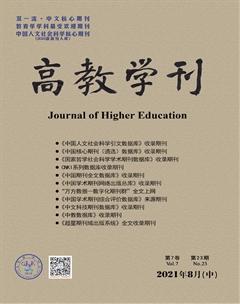新技術革命背景下的校企產教融合路徑研究
張衛豐 邢云鳳
摘? 要:5G技術的發展,啟動了新技術革命,催化了物聯網、車聯網、人工智能等技術潮流不斷涌現,造就了大量高端技能人才需求,而產教深度融合的發展道路是培養合格高端技能人才的必由之路。文章闡述了校企產教融合的意義,展現了國內高職院校產教融合的現狀,描述了產學深度融合的不同途徑,給出了產教融合的實踐效果,實踐證明,校企產教深度融合是高職教育發展的有效途徑,可以有效提高人才培養質量,產出合格高端技能人才。
關鍵詞:校企合作;產教融合;新技術革命
中圖分類號:G640? ? ? ? 文獻標志碼:A? ? ? ? ?文章編號:2096-000X(2021)23-0077-04
Abstract: The development of 5G technology has initiated a new technological revolution, catalyzed the continuous emergence of technological trends such as the Internet of things, the Internet of vehicles and artificial intelligence, and created a large number of high-end skill talents. The development path of deep integration of industry and education is the only way to cultivate qualified high-end skill talents. This paper expounds the significance of the integration of industry and education between schools and enterprises, describes the current situation of the integration of industry and education in higher vocational colleges in China and the different approaches of the integration of industry and education, and gives the practical effects of the integration of industry and education. Practice has proved that the deep integration of production and education between schools and enterprises is an effective way for the development of higher vocational education, which can effectively improve the quality of talent training and produce qualified high-end skilled talents.
Keywords: school-enterprise cooperation; integration of production and education; new technological revolution
《高技能人才隊伍建設中長期規劃(2010-2020年)》指出,為更好實施人才強國戰略,適應走新型工業化道路和產業結構優化升級的要求,我國必須培養造就一大批具有精湛技藝的高技能人才。高等職業教育是我國高等教育重要組成部分,具有高等教育和職業教育雙重屬性,肩負著培養高端技能技術人才的重任。《教育部關于推進高等職業教育改革創新引領職業教育科學發展的若干意見》明確指出,高等職業教育必須堅持以服務為宗旨、以就業為導向,走產學研結合發展道路的辦學方針。教育部等六部門關于印發《職業學校校企合作促進辦法》的通知指出,產教融合、校企合作是職業教育的基本辦學模式,是辦好職業教育的關鍵所在。《國家職業教育改革實施方案》指出,推動校企全面深度合作,堅持知行合一、工學結合,及時將新技術、新工藝、新規范納入教學標準和教學內容。因此,高職教育,必須遵遁高職教育的職業特點,走產教融合發展道路[1-3]。
一、校企產教融合現狀
在世界高等教育發展史上,產教深度融合,校企聯合辦學在高等教育中發揮了重要作用,是當前發達國家高等教育的成功經驗。這些教育理念領先的發達國家通過多種形式、多種途徑的校企合作模式來豐富職業教育的內容,培養職業型人才的適任能力,以滿足經濟社會的發展需求,實現了校企在人才培養方面上的優勢互補作用,促進了校企合作的規范運行。
近年來,國內高職教育在充分調研國外職業教育發展基礎上,根據中國國情,進行了項目化的產教融合高職教育嘗試。如深圳信息職業技術學院對數字電子技術課程和單片機應用課程進行了項目化改革,王瑞春老師于2008年成功申請了“基于工作過程的數字電子技術課程改革”教研項目,并聯合企業,開發了項目化《數字電子技術》教程。潘曉寧博士提出了“工學結合模式下的電子技能(單片機與C51整合)課程及實訓教具的開發”教研項目,并開發了項目化《單片機應用》教材。他們的成果在信息類專業的數字電路和單片機開發與制作課程教學中獲得應用,整個教學課堂完全以項目為載體,教學中提取典型工作場景進行教學,相對于傳統的教學模式,教學效果良好,學生學習積極性顯著提高。針對機電專業單片機C語言課程中算法難理解等難題,南通航運職業技術學院李愛芹老師在電子產品開發課程中提出采用項目教學法,對知識進行解構與重構,實現項目教學,教學效果提升明顯。基于“校企合作、項目引導、分層遞進”的工學結合人才培養模式,九江職業技術學院龔素文等老師將工學結合的項目課程教學改革應用在電子產品制造與檢修中,教學效果良好。

